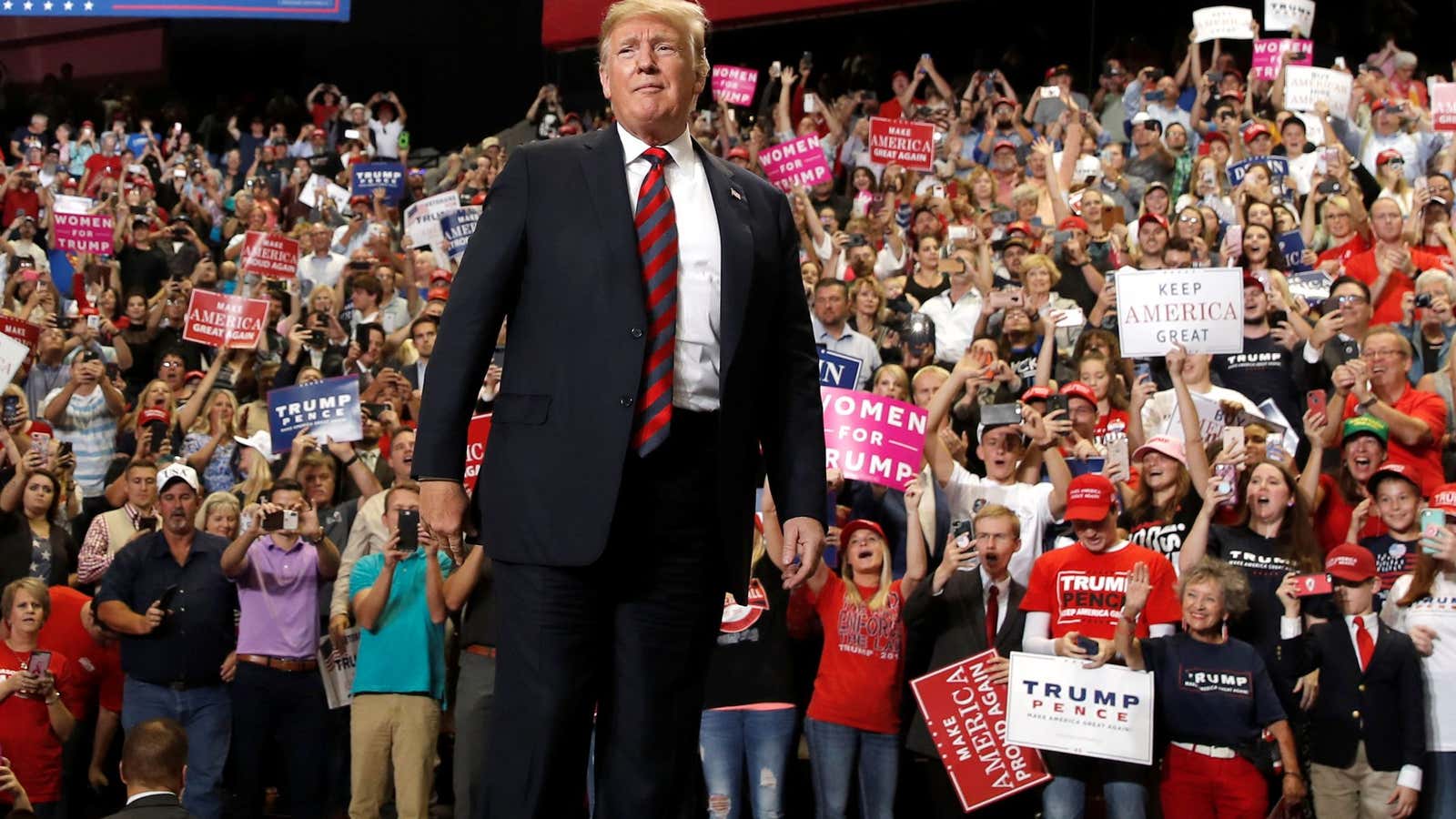With just hours to go before the midterm elections, US President Donald Trump was tweeting up a storm about some of 2018’s most hotly contested races, as well as those the Republican party is most afraid that it may lose.
Here’s a closer look at some of the issues the president has been tweeting about—and how much of it was true.
CNN’s election coverage
According to its website, CNN uses “both polls by nonpartisan groups and partisan organizations,” though they “control for whether the poll is conducted for a partisan or nonpartisan organization.” Most of these are the same polls used by other news organizations, regardless of political bent: SSRS, for instance, works with the Pew Research Center, ESPN, and the George W. Bush Institute.
Though CNN doesn’t have the same audience as Trump’s preferred network, Fox News, the cable news network’s ratings have actually been quite strong of late: In October, CNN posted growth in total prime time viewers, defeating rival MSNBC for the first time since August.
Illegal voting
Trump’s spoken out in the past about election fraud, which he believes to be rife. His investigation last year into the so-called “massive voting fraud” in the 2016 presidential election failed to turn up any evidence—hindered in part by the fact that some 44 states refused to hand over their voter data. But most studies suggest that voter fraud is vanishingly rare: you’re more likely to be hit by lightning than you are to have your identity stolen by a would-be voter.
The state of the economy—and what it has to do with his administration
To a certain extent, Trump is right: The economy’s in good shape, and unemployment is the lowest it’s been in years. But whether the Republicans can take the credit isn’t such a sure thing. Trump inherited an already quite healthy economy, as his predecessor reminded supporters in September. In the two years since, it’s continued along much the same path as it has done since the end of the recession.
Whether it’s the best economy in the history of the country, as Trump has often claimed, is more doubtful. The real “golden years,” economists suggest, were back in the 1950s and 1960s, when America experienced record growth.
As to whether or not the Democratic agenda is “socialist,” it really depends who you ask. American politicians who describe themselves as socialists, such as congressional candidate Alexandria Ocasio-Cortez, are quite rare. Senator Bernie Sanders, a longtime independent who caucuses with the Democrats, also identifies as a socialist—but even then, many political commentators say that Sanders isn’t a socialist in the technical sense of the word, as he seeks to reform capitalism rather than overthrow it. Most other Democratic politicians seem to be on the same page, if they seek such reforms at all.
The Senate election in Michigan
Republicans are pinning their hopes to their party’s Michigan senate candidate, John James, an Iraq War veteran and current businessman. But polls suggest he’s all but certain to lose: he’s yet to come out on top in a single poll this year, though more recent results indicate the race may be narrowing.
Incumbent Debbie Stabenow has held the seat since 2000, and looks set to keep it for yet another term. Along with every other Democratic senator, she voted against last year’s tax overhaul bill. She also voted against Supreme Court Justice Brett Kavanaugh’s confirmation. But Trump is misrepresenting her record on health care: Though she did not support Republican efforts to overhaul Medicare, she’s introduced numerous bills related to affordable healthcare and drugs, especially for the elderly, and to support healthcare for mental illness.
…and everything else
In the space of 24 hours, Trump tweeted nearly 20 times—almost three times his daily average. Many tweets are impossible to fact-check with any accuracy: whether Bill Nelson is “a stiff,” for instance. Others, like a so-called “assault on our sovereignty” from any incoming Democrats, are all but impossible to engage with in factual terms.
But perhaps the most worrying tweets are those that are allusive rather than specific—repeated references to keeping “criminals, traffickers & drug dealers OUT of our Country,” with the same fear-mongering rhetoric that people have come to expect from the president. But whether it will prove as successful this election cycle remains to be seen.
